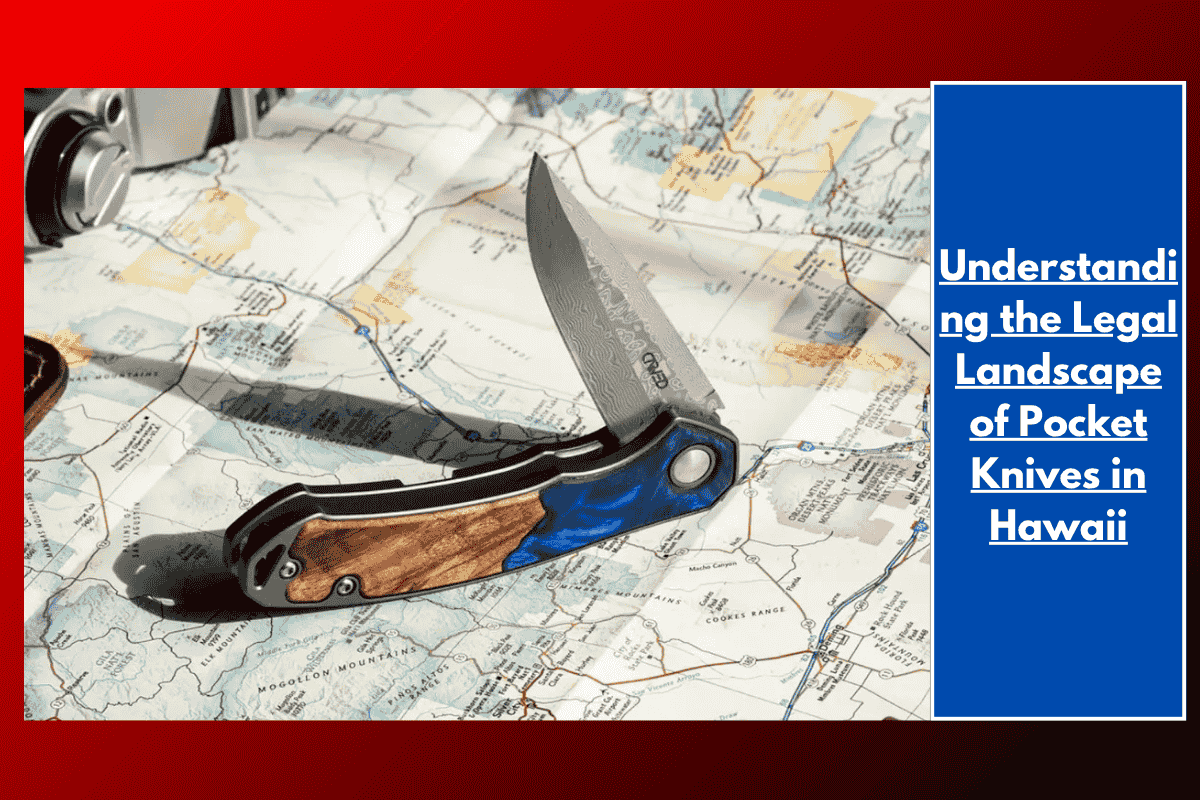Pocket knives are versatile tools that many people carry for everyday tasks. However, in Hawaii, the laws surrounding the possession and carry of pocket knives are not as straightforward as they might seem. It’s important to know the local regulations to avoid legal trouble. Whether you use a pocket knife for work, camping, or personal use, understanding the legal boundaries in Hawaii will help you stay compliant with the law.
Are Pocket Knives Legal in Hawaii?
Yes, pocket knives are legal in Hawaii, but there are rules about how and where they can be carried. Hawaii law doesn’t make pocket knives illegal outright, but it does impose restrictions on carrying them in certain situations. The key factors to consider are the type of knife, how you carry it, and whether you are carrying it in a restricted area.
Hawaii’s Knife Laws: The Basics
Hawaii law allows the possession of pocket knives, but the legalities of carrying them vary. There are restrictions based on the blade’s length and the manner in which the knife is carried. The law is primarily concerned with ensuring that knives are not used for criminal purposes, such as assault or theft.
Key Points to Consider About Hawaii’s Knife Laws
Concealed Carry: In Hawaii, carrying a knife concealed on your person is generally prohibited. This means that if you’re carrying a pocket knife in your pocket, bag, or other concealed locations, you could be breaking the law. However, if the knife is openly visible, it is typically allowed. As a general rule, knives should be carried in a way that they are visible to others and not hidden from sight.
Length of the Blade: While Hawaii doesn’t have specific laws on the exact length of the blade for all types of knives, there are general restrictions regarding the size of the blade if it’s carried concealed. Pocket knives with shorter blades are less likely to face legal challenges compared to larger knives, which might be considered dangerous weapons if carried in public without a legitimate reason.
Switchblades and Automatic Knives: Hawaii has strict laws on the possession and carrying of switchblades and automatic knives. These knives, which open automatically with the press of a button, are more heavily regulated. In Hawaii, it is illegal to possess, carry, or sell switchblades or automatic knives unless they are required for a specific purpose, such as for law enforcement or military use.
Intent and Usage: The intent behind carrying a pocket knife can also affect its legality. If you are carrying a knife for legitimate purposes—such as for work, outdoor activities, or self-defense—it is less likely to lead to legal trouble. However, carrying a knife with the intent to use it as a weapon or for unlawful purposes can lead to serious legal consequences.
Carrying in Restricted Areas: While it may be legal to carry a pocket knife in most public spaces in Hawaii, there are restrictions on carrying knives in certain places, such as schools, government buildings, or private properties where they are not allowed. These rules apply not only to pocket knives but to all types of knives, so it’s important to know where you are allowed to carry a knife.
What Happens If You Violate Hawaii’s Knife Laws?
If you are caught carrying a pocket knife illegally in Hawaii, you could face criminal charges. The penalties for violating knife laws in Hawaii vary depending on the circumstances, such as whether the knife was concealed or carried with intent to commit a crime. In some cases, you may be charged with a misdemeanor, while in more serious cases, such as carrying a knife for unlawful purposes, you could face felony charges.
Penalties for carrying a knife illegally can include fines, imprisonment, or both, depending on the severity of the violation. If the knife is used in the commission of a crime, the penalties can be much more severe.
How to Legally Carry a Pocket Knife in Hawaii
To ensure you are carrying a pocket knife legally in Hawaii, here are some best practices:
Carry it openly: Avoid carrying a pocket knife in a concealed manner. If the knife is visible, it is much less likely to cause legal trouble.
Check for blade length restrictions: While Hawaii doesn’t have specific restrictions for every type of knife, it’s wise to avoid carrying larger knives unless you have a clear, lawful reason for doing so.
Know where you can carry it: Be aware of areas where knives are prohibited, such as schools, government buildings, and other private properties. Make sure you’re not breaking any rules when entering these places.
Use the knife for legitimate purposes: Carry a pocket knife for lawful reasons, such as for work or personal use, rather than carrying it for the purpose of self-defense or intimidation.
In Hawaii, pocket knives are legal, but they are subject to certain regulations that govern their carry and use. While it’s not illegal to own a pocket knife, you need to follow the rules about how and where you carry it to avoid breaking the law. The key is to ensure that your knife is not concealed, that it is carried for legitimate purposes, and that you are aware of the specific places where knives are restricted. By understanding and following these regulations, you can enjoy the convenience of carrying a pocket knife without running into legal issues.
SOURCES
[1] https://tkellknives.com/knife-laws-in-hawaii-understanding-the-aloha-states-regulations/
[2] https://www.akti.org/state-knife-laws/hawaii/
[3] https://nobliecustomknives.com/us-knife-laws/hawaii-knife-laws/
[4] https://www.reddit.com/r/Hawaii/comments/1djs306/what_exactly_are_the_new_knife_laws/
[5] https://huroninsider.com/understanding-the-legal-landscape-of-pocket-knives-in-hawaii/














